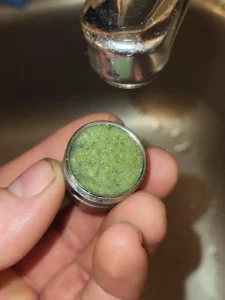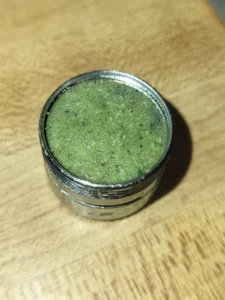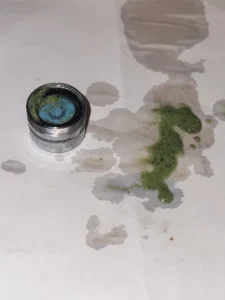A questioner said:
What is this stuff? Every 2 or 3 days after running the hot water in my apartment, my aerator clogs up with whatever this crap is. Can anyone give me an idea of what this is? Should I be concerned about the quality of water in my apartment?



Some of the people opinions on it:
Legitimate-Ad-2905: “Looks like algae, which probably means your hot water tank & system needs cleaning or maybe even replacing.”
Longjumping-Tooth-77: “The green is probably biological growth from sitting in the aerator.”
Jacobysmadre: “Makes me nervous that your water heater isn’t hot enough…”
spavolka: “Might be water softener media.”
Linkscousin: “Do not drink and get water tested ASAP.”
Majin_Sus: “Greensand filter?”
Crystalysism: “Does your water taste funny?”
olbie67: “I thought that was a grinder lol.”
MichaelCG8: “That’s broccoli soup, likely caused by a vegetarian living in your pipework.”
mista138: “Resin beads from your water softener.”
What do you think? Let us know in the comment!
Read Also: Does anyone know what this is/was used for and what it is called?—————————————————–
If you’ve noticed an annoying pattern of your faucet aerator clogging up every few days after running hot water in your apartment, you’re not alone. Many people encounter similar issues, often wondering about the cause and potential implications for water quality.
Identifying the Problem
The culprit behind your clogged aerator is likely sediment or mineral deposits in your water supply. When you run hot water, especially if your water heater hasn’t been recently flushed or if there are issues with sediment buildup in your pipes, these particles can get dislodged and end up clogging the aerator mesh. This phenomenon is more common in older buildings or areas with harder water.
Should You Be Concerned About Water Quality?
While sediment buildup isn’t typically harmful to health, it can indicate underlying issues with your plumbing system or water quality. Here are a few considerations:
Water Source and Quality: If your apartment’s water comes from a municipal supply, it undergoes regular testing to meet safety standards. However, older pipes or plumbing systems can contribute to sediment issues. Consider asking your building management about water quality reports or conducting your own test if you’re concerned.
Potential Solutions: To mitigate the clogging issue, you can try the following:
Clean the Aerator Regularly: Remove the aerator regularly and clean out any sediment or debris.
Flush Your Water Heater: Sediment buildup in your water heater can exacerbate the issue. Flushing the water heater periodically can help remove accumulated particles.
Install a Filter: Consider installing a whole-house or point-of-use water filter to trap sediment before it reaches your faucets.
Consultation with Professionals: If the problem persists or if you’re unsure about the water quality, consult a plumber or water quality expert. They can assess your plumbing system, check for any issues, and provide recommendations tailored to your situation.
Conclusion
Dealing with a clogged aerator due to sediment buildup is a common issue in many households and apartments. While it’s generally a nuisance rather than a serious health concern, it’s essential to stay vigilant about water quality. Taking proactive steps like regular cleaning, maintenance of your water heater, and potentially installing filters can help alleviate the issue and ensure your water remains safe and clean for everyday use.
By staying informed and proactive, you can manage and possibly improve the situation, ensuring a more pleasant and worry-free experience with your apartment’s water supply.





